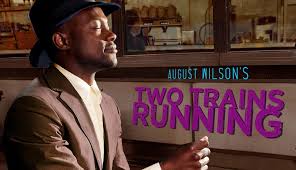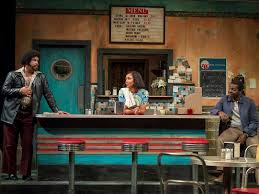

August Wilson wrote some of our era’s most extraordinary plays, namely his Pittsburgh Cycle, alternately known as the American Century Cycle — plays that dramatize the African American experience decade by decade, throughout the 20th century. The seventh play in that cycle, Two Trains Running, from 1992, can be seen in a remarkable production at Milwaukee Repertory Theater. For the record, the Rep has produced seven out of the 10 August Wilson plays in recent seasons. Two Trains Running is its only August Wilson offering this season. Smartly, this tale of an African-American community under the stress of urban renewal was saved for its final offering of the season. The wait was worth it. In the beginning, Two Trains Running played around the country before it landed on Broadway in 1992. The play was nominated for a Tony Award and a Pulitzer Prize that year, and Laurence Fishburne (as Sterling) won the Tony for Best Featured Actor in a Play. Fast forward 27 years, and welcome to the Milwaukee Repertory Theater’s current version. At first glance, audiences are fully immersed in a now rundown neighborhood that is scheduled to be razed in the name of “urban development.” The year is 1969. Once, trainloads of blacks landed in northern cities and took up residence in certain neighborhoods. Eventually, the white money fled to the suburbs and crime and poverty set in. The black-owned businesses all but dried up (except for a boost to one character’s funeral business). In Pittsburgh, the Urban Redevelopment Authority seized land in the are and used eminent domain to squeeze out the remaining business owners. This is such a neighborhood. One of these business owners is Memphis (Raymond Anthony Thomas). He sits in his nearly empty diner and recalls the days when the place was packed. “You couldn’t hardly get out of your chair before someone was waiting to take your place,” he said. “I used to buy a crate of chickens on Friday and they’d be all gone by Sunday.” But those days are long gone, and Memphis is eager to have his property snapped up by the city, “as long as I get my price,” he says. Memphis’s attitude reflects his need for the dignity and respect for which he has been denied. He names an outlandish price - $25,000 – as the lowest price he’ll take for his property. Meanwhile, West (the shrewd undertaker) has offered him $15,000 for the same property. Memphis is tempted, but he sticks by his guns. Besides, he resents that West (a well-dressed and well-mannered Doug Brown) has bought up nearly all the abandoned buildings in the area.
The restaurant is a daily gathering place for a few down-and-out residents, the most outspoken of which is Holloway (Michael Anthony Williams). Holloway begins with a monologue about a deceased preacher, Prophet Samuel. Not only is Holloway on good terms with this spiritual leader, he’s also on good terms with another of the neighborhood’s fixtures, Aunt Esther. Holloway insists she is 322 years old.
Later in the play, Holloway expresses his feelings about how black people have been mistreated by whites through history. “When we were slaves, they (whites) had plenty of work for us,” he muses. “Now that they got to pay us, suddenly, there is no work.”
Hitting the last point home is a newcomer to the group, Sterling (Chické Johnson). He’s just out of prison and comes around to the diner, looking for a job. When his early job leads don’t pan out, he hustles a few dollars to play the numbers with Wolf (Jefferson A. Russell), the town’s numbers runners. Sterling (played with a slick, street-smart charm by Johnson) also attempts to woo the restaurant’s only waitress, Risa (Malkia Stampley). But Risa is wise to the ways of men, and she mostly tends to pouring coffee and serving bowls of beans ordered by her diners. She uncomplainingly takes a considerable amount of verbal abuse from Memphis, who seems unaware that he could show her some appreciation. This is ironic, given Memphis’ own need for self-validation.
Finally, the character of Hambone (Frank Britton) shows a man at the end of his rope. For nearly 10 years, he has been waiting to receive a ham that a white store owner offered him for painting a fence. “I want my ham!” is probably the most-uttered words in the play. Hambone, for all his mental problems, wants the same dignity and respect that Memphis demands from the white man.
Sterling is a dreamer as well as an unemployed con. He passes out leaflets to an upcoming rally for Malcolm X’s birthday and begs Risa to join him. Memphis scoffs at the idea, and so, initially, does Risa. There is some talk about Martin Luther King and Jesus, and the older men seem to shrug off the efforts to organize efforts for the civil rights movement and the Black Power movement.
Risa, Sterling and Wolf attend the rally and seem no worse the wear for it. Wolf points out that the police were there, too, snapping pictures. “You don’t see them taking pictures when white folks get together,” he muses.
The play’s title is taken from a piece of dialogue, in which Memphis notes that there are two trains a day running between Jackson, Miss. and Pittsburgh. Memphis lost a farm in Jackson due to a sneaky clause in the land’s contract, and he vows to return to his agricultural farming roots if his price is met for the building. Or, he tells himself, he might open an even bigger restaurant on a more prosperous side of town.
The play crackles with intensity throughout, thanks to an outstanding cast under the direction of Timothy Douglas. The rundown diner is realistic to a “t,” with its faded Formica countertops and squares of linoleum lining the floor. There’s even a broken jukebox in one corner. Credit goes to Tony Cisek. Also supporting the cast is appropriate lighting by Michael Gilliam and spot-on costumes by Kara Harmon.
